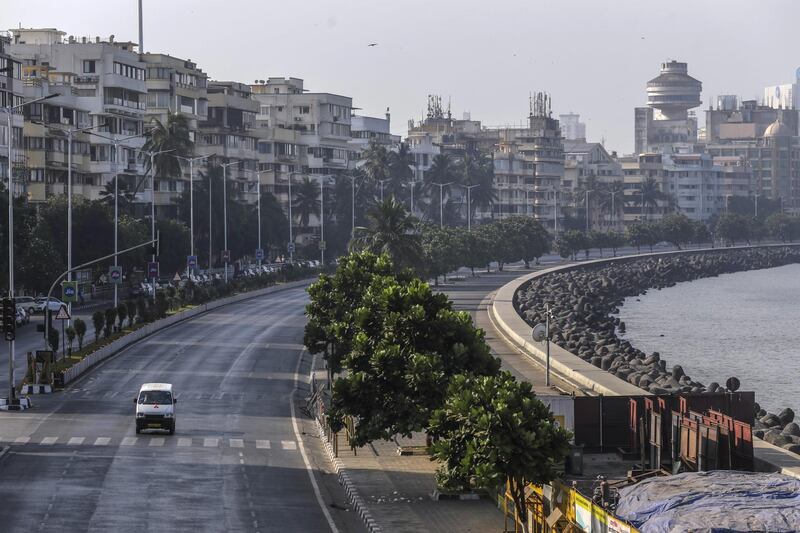Scenes of migrant labourers, left without work and fleeing India's cities, in some cases walking hundreds of kilometres to return to their villages, will be a lasting impression of the country's nationwide lockdown to combat the coronavirus pandemic.
The lockdown is not only impacting the poor whose jobs are evaporating, as the world’s fifth-largest economy nearly completes its third week of lockdown. Most offices and shops are closed and the economy is being hit hard, as the number of infections continues to rise sharply.
“Job cuts are already happening at mid and junior levels,” says Jyoti Bowen Nath, the managing partner at Claricent Partners, an executive hiring firm based in Mumbai. “And it will happen at leadership level too.”
She says that 80 per cent of the recruitment cases they were handling for executive positions have “gone on hold indefinitely ... because nobody is able to predict the trajectory of the virus and when this whole thing is going to end”.
“We don't know if they'll ever be revived because it all depends on the economic impact on those particular businesses.”
Investment bank Goldman Sachs has one of the bleakest economic forecasts for India. It expects the country's gross domestic product growth to come in at a multi-decade low of 1.6 per cent in the current financial year, down from its earlier estimate of 5.8 per cent. That's largely because of the losses caused by the lockdown and a slowdown in the global economy. The consensus is that – as a developing economy – India needs to grow by about 8 per cent a year in order to create enough jobs for its young population and lift people out of poverty.
Analysts say this makes the current scenario especially worrying for India, which has a population of more than 1.3 billion. Newly released data by the Centre for Monitoring Economy reveals India's unemployment rate surged to 23.4 per cent on April 5 from 8 per cent.
“The labour participation rate fell to an all-time low, the unemployment rate shot up sharply and the employment rate fell to its all-time low,” says Mahesh Vyas, the managing director and chief executive at the Centre for Monitoring Indian Economy.
“The deteriorating labour statistics is a direct consequence of the Covid-19 national lockdown,” says Sonal Varma, the chief India economist at Japanese investment bank Nomura. “It matches anecdotal evidence in the past few weeks of a mass exodus of labourers.”
Casual or daily wage labourers who earn just a few dollars a day were the first to be hit as a three-week nationwide lockdown came into effect from March 25. People are only supposed to venture outside for essential supplies. However, with the lockdown now expected to be extended, analysts are projecting a rise in the unemployment rate.
“We expect unemployment to remain elevated, with a potentially longer period of lockdown and larger growth damage,” says Ms Varma.
Unemployment levels even before the coronavirus pandemic were on the rise.
The economy had slowed before the outbreak because of weak consumer spending and sluggish private investment, yet there were hopes of a wide-ranging economic recovery this year. But a prospect of a prolonged lockdown is now leading to a revision of growth projection.
A top executive at a large Indian electronics says his company has been left with no option but to cut jobs over the coming days - in order for the business stay afloat during what is an unprecedented situation for companies in India. “It's the best case scenario that we're cutting jobs,” says the source. “We have to survive.”
He says that the plan is to axe several senior jobs at the company in an effort to reduce its overhead costs at a time when its revenue is plummeting.
The Indian government has urged companies not to cut jobs and salaries, but the source points out that this is simply not possible given the impact of the lockdown as manufacturing has largely ground to a halt.
Ms Nath explains some people who were offered jobs and had resigned from their previous roles, are now in limbo, as the offers have been withdrawn because of the coronavirus.
“There are also pay cuts,” she says. “I know so many senior level candidates who have been working with good, renowned companies and they have announced pay cuts. In some cases it is 50 per cent and some cases it's more than that.”
India’s lockdown has also severely affected the local hospitality and travel industries. The Confederation of Indian Industry estimates that up to 50 million jobs could be lost in the tourism sector because of the impact of the pandemic.
A survey by the organisation also revealed that 52 per cent of chief executives expect there to be job losses in their respective sectors because of Covid-19.
Left with zero revenues in many cases, small businesses are particularly having a hard time as they struggle to pay staff. To mitigate the effects of Covid-19, Reuters reported last week that the government is set to announce an economic stimulus package worth $13 billion (Dh47.7bn) to help small and medium businesses.
The first economic relief package, which totalled more than $22bn, was targeted at poor people by providing free food and some cash handouts. But analysts say that this fell short and much more stimulus will be needed. Other steps that have been taken include a 75 basis point emergency interest rate cut by the Reserve Bank of India.
The Associated Chambers of Commerce and Industry of India, a lobby group, says a minimum of $200bn in stimulus will be needed for the country's economy over the next 12 to 18 months.
“The trouble here is that India is also bound by something called the fiscal responsibility and budget management, so it can't really go beyond a certain threshold, because then it could be downgraded by global rating agencies,” says Karan Mehrishi, the lead economist at Acuité Ratings & Research. The Mumbai-based firm estimates India's economy is losing $4.6bn each day of the lockdown.

Smruti Kasulwar, the vice president of human resources and administration at Salaam Bombay Foundation, an NGO, says that the current scenario is worrying for employment in the country and that companies should try to conserve jobs.
“The countrywide lockdown has impacted the domestic economy with a majority of firms expecting a significant decline in their top line and bottom line,” she says. “However, companies should have a solution-oriented approach and try to save as many jobs as possible.”
Ms Kasulwar points out that there are some industries, which could see a spike in hiring.
“On the brighter side, hiring in digitised sectors like e-commerce and e-logistics is bound to grow in the coming months,” she says. “Many consumers are now putting impetus to buy items through the online e-commerce portals as the physical retail stores have taken a back seat. Hiring in the pharma sector, fast moving consumer goods and the telecom will be up in the coming months as these are sectors that will also witness growth in coming days.”
As a recruiter, Ms Nath says she is now focusing on such sectors, which will be key to the survival of her own company amid the current crisis. “Whenever there's any disruption, there's also an opportunity,” she says.







